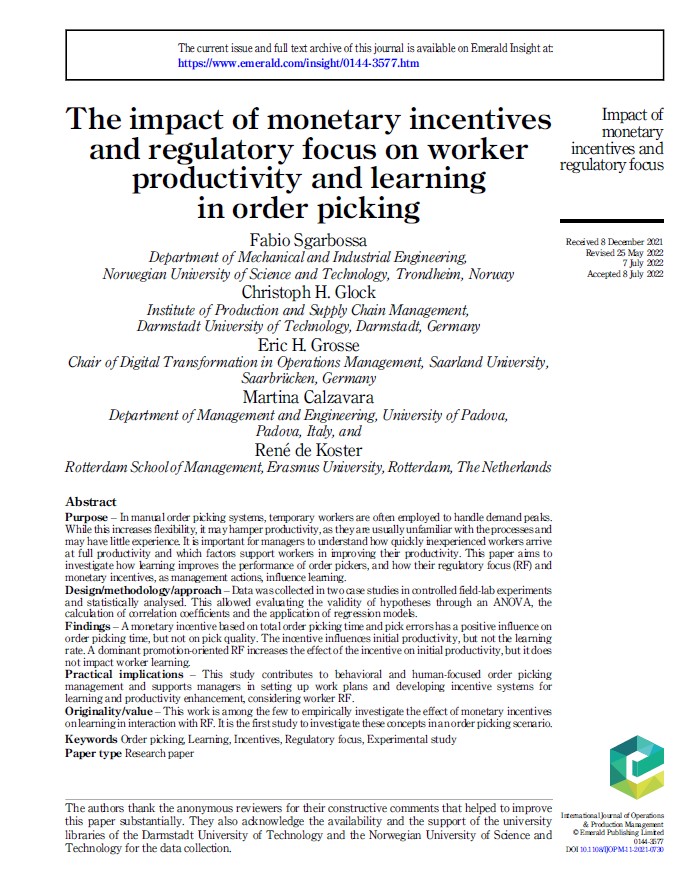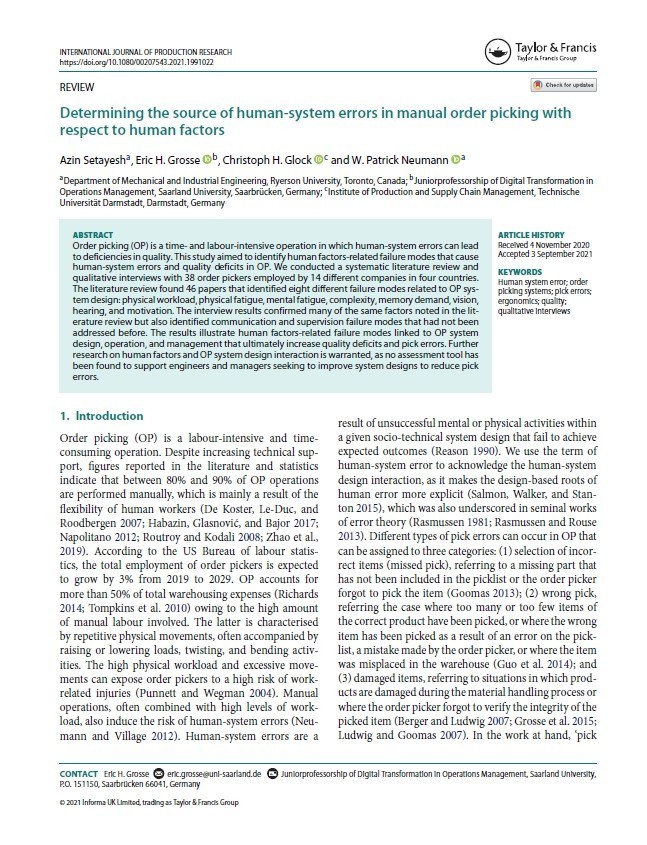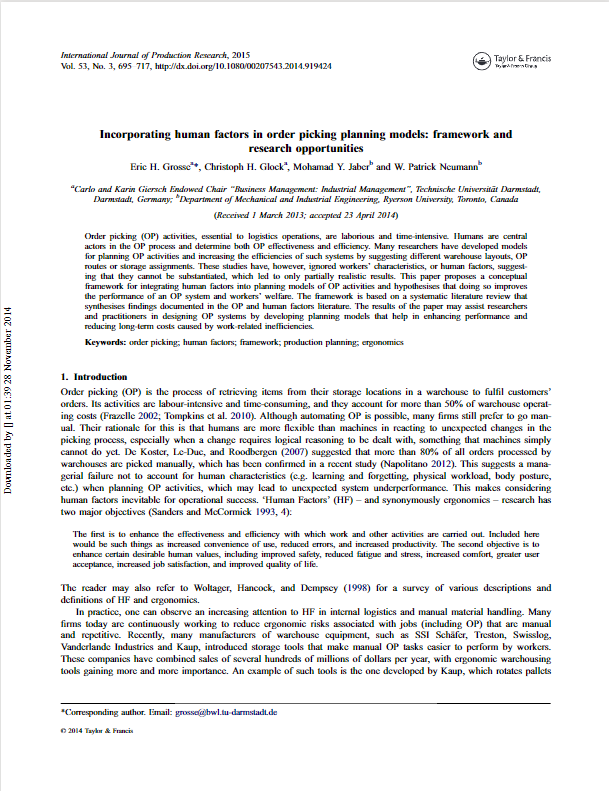Behavioral Order Picking
Publikationen
The impact of monetary incentives and regulatory focus on worker productivity and learning in order picking
Sgarbossa, Glock, Grosse, Calzavara & de Koster (2022)
International Journal of Operations & Production Management
Purpose: In manual order picking systems, temporary workers are often employed to handle demand peaks. While this increases flexibility, it may hamper productivity, as they are usually unfamiliar with the processes and may have little experience. It is important for managers to understand how quickly inexperienced workers arrive at full productivity and which factors support workers in improving their productivity. This paper aims to investigate how learning improves the performance of order pickers, and how their regulatory focus (RF) and monetary incentives, as management actions, influence learning. Design/methodology/approach: Data was collected in two case studies in controlled field-lab experiments and statistically analysed. This allowed evaluating the validity of hypotheses through an ANOVA, the calculation of correlation coefficients and the application of regression models. Findings: A monetary incentive based on total order picking time and pick errors has a positive influence on order picking time, but not on pick quality. The incentive influences initial productivity, but not the learning rate. A dominant promotion-oriented RF increases the effect of the incentive on initial productivity, but it does not impact worker learning. Practical implications: This study contributes to behavioral and human-focused order picking management and supports managers in setting up work plans and developing incentive systems for learning and productivity enhancement, considering worker RF. Originality/value: This work is among the few to empirically investigate the effect of monetary incentives on learning in interaction with RF. It is the first study to investigate these concepts in an order picking scenario.
Determining the source of human-system errors in manual order picking with respect to human factors
Setayesh, Grosse, Glock & Neumann (2021)
International Journal of Production Research
Order picking (OP) is a time- and labour-intensive operation in which human-system errors can lead to deficiencies in quality. This study aimed to identify human factors-related failure modes that cause human-system errors and quality deficits in OP. We conducted a systematic literature review and qualitative interviews with 38 order pickers employed by 14 different companies in four countries. The literature review found 46 papers that identified eight different failure modes related to OP system design: physical workload, physical fatigue, mental fatigue, complexity, memory demand, vision, hearing, and motivation. The interview results confirmed many of the same factors noted in the literature review but also identified communication and supervision failure modes that had not been addressed before. The results illustrate human factors-related failure modes linked to OP system design, operation, and management that ultimately increase quality deficits and pick errors. Further research on human factors and OP system design interaction is warranted, as no assessment tool has been found to support engineers and managers seeking to improve system designs to reduce pick errors.
Maverick picking: The impact of modifications in work schedules on manual order picking processes
Glock, Grosse, Elbert & Franzke (2017)
International Journal of Production Research 55(21)
Order picking, the process of retrieving items from their storage locations to fulfil customer orders, ranks among the most labour- and time-intensive processes in warehousing. Prior research in this area had a strong focus on the development of operating policies that increase the efficiency of manual order picking, for example by calculating optimal routes for the order pickers or by assigning products to storage locations. One aspect that poses a major challenge to many warehouse managers in practice has, curiously enough, remained largely unexplored by academic research: modifications in workflows (i.e., workplace deviance in a positive or negative sense) in order picking, which we define as “maverick picking”. The purpose of this paper is to characterize maverick picking and to study its causes, its forms of appearance, and its potential impact on order picking performance. To gain insights into maverick picking, we first survey the literature to illustrate the state-of-knowledge of maverick picking. Subsequently, we report the results of a multi-case study on maverick picking and deduct a related content framework. The results of our case study support the proposition that maverick picking is highly relevant in practice and that it is a major determinant of order picking performance.
The effects of human behavior on the efficiency of routing policies in order picking: The case of route deviations
Elbert, Franzke, Glock & Grosse (2017)
Computers & Industrial Engineering 111
Retrieving items from storage locations in warehouses, commonly referred to as order picking, is often performed by human workers in practice. The high amount of human work involved in order picking turns this activity into a time- and cost-intensive process step in warehouse operations. Due to the cost impact of manual order picking, researchers have developed various planning methods that support practitioners in realizing an efficient order picking process. Among these planning approaches, methods that support the routing of order pickers through the warehouse have been a very popular research topic in recent years, with the focus being both on the development of optimal and heuristic routing policies. Surprisingly, problems that may arise when implementing picker routes for human workers in practice have not been investigated so far. There is, however, empirical evidence that order pickers tend to deviate from optimal routes in practice, putting the efficiency of these routing approaches at stake.
Human factors in order picking: A content analysis of the literature
Grosse, Glock & Neumann (2016)
International Journal of Production Research 55(5)
Order picking (OP) is one of the most labour- and time-intensive processes in internal logistics. Over the last decades, researchers have developed various mathematical planning models that help to increase the efficiency of OP systems, for example, by optimising storage assignments or by specifying routes for the order pickers that minimise travel distance in the warehouse. Human characteristics that are often a major determinant of OP system performance have, however, widely been ignored in this stream of research. This paper systematically evaluates the literature on manual OP systems and conducts a content analysis to gain insights into how human factors (HF) have been considered and discussed in the scientific literature. The results of the analysis indicate that management-oriented efficiency criteria dominated prior research on OP, and that there is a clear lack of attention to HF in the design and management of OP systems. This poses an opportunity for research and design of manual OP systems.
Using qualitative interviewing to examine human factors in warehouse order picking: Technical note
Grosse, Dixon, Neumann & Glock (2016)
International Journal of Logistics Systems and Management 23(4)
The effect of human factors on the performance of labour-intensive order picking processes has thus far been relatively understudied in the operations and logistics management literature. This technical note offers guidance to researchers and managers regarding how qualitative methods can be used to assess human factors in order picking. The paper first discusses manual tasks in this process and highlights where human factors influence the outcomes of time, quality and worker health. This discussion is used to inform the development of a qualitative example interview guide to investigate the order picking system. The paper provides step-by-step guidance for using interviewing to assist researchers and logistics managers that emphasises considering human factors in the planning of order picking processes. Using qualitative methods to integrate human factors into order picking processes can help to avoid workers’ exposure to musculoskeletal disorders and improve the quality and efficiency of order picking systems.
The effect of worker learning on manual order picking processes
Grosse & Glock (2015)
International Journal of Production Economics 170
Order picking is a time-intensive and costly logistics process as it involves a high amount of manual human work. Since order picking operations are repetitive by nature, it can be observed that human workers gain familiarity with the job over time, which implies that learning takes place. Even though learning may be an important source of efficiency improvements in companies, it has largely been neglected in planning order picking operations. Mathematical planning models of order picking that have been published earlier thus provide an incomplete picture of real-world order picking, which affects the quality of the planning outcome. To contribute to closing this research gap, this paper presents an approach to model worker learning in order picking. First, the results of a case study are presented that emphasize the importance of learning in manual order picking. Subsequently, an analytical model is developed to describe learning in order picking, which is then evaluated with the help of numerical examples. The results show that learning impacts order picking efficiency. In particular, the results imply that worker learning should be considered when planning order picking operations as it leads to a better predictability of order throughput times. In addition, the effects of learning are relevant for the allocation of available resources, such as the allocation of workers to different zones of the warehouse. The results of the numerical analysis indicate that it is beneficial to assign workers with the lowest learning rate in the workforce to the fast moving zone to gain experience.
Incorporating human factors in order picking planning models: Framework and research opportunities
Grosse, Glock, Jaber & Neumann (2015)
International Journal of Production Research 53(3)
Order picking (OP) activities, essential to logistics operations, are laborious and time-intensive. Humans are central actors in the OP process and determine both OP effectiveness and efficiency. Many researchers have developed models for planning OP activities and increasing the efficiencies of such systems by suggesting different warehouse layouts, OP routes or storage assignments. These studies have, however, ignored workers’ characteristics, or human factors, suggesting that they cannot be substantiated, which led to only partially realistic results. This paper proposes a conceptual framework for integrating human factors into planning models of OP activities and hypothesises that doing so improves the performance of an OP system and workers’ welfare. The framework is based on a systematic literature review that synthesises findings documented in the OP and human factors literature. The results of the paper may assist researchers and practitioners in designing OP systems by developing planning models that help in enhancing performance and reducing long-term costs caused by work-related inefficiencies.









